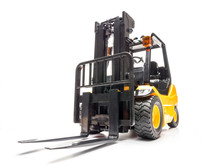The Future of Forklifts: Trends from Leading Manufacturers
The Future of Forklifts: Trends from Leading Manufacturers
Blog Article

As industries evolve, the demand for more efficient and innovative material handling solutions grows. Forklifts, as essential components of warehouse and logistics operations, are at the forefront of this change. Leading forklift manufacturers are embracing advanced technologies and sustainable practices to meet the shifting needs of businesses around the globe.
From electric models that reduce environmental impact to smart forklifts equipped with sensors and automation capabilities, the future of these machines looks promising. As we explore the trends emerging from major manufacturers, it becomes clear that the focus is not only on enhancing performance but also on improving safety and functionality within the workplace. These developments signal a transformative era for forklift technology and its role in shaping the supply chain of tomorrow.
Innovative Technologies in Forklifts
Best Rated Electric Forklifts
The forklift industry is rapidly evolving with the introduction of innovative technologies that enhance efficiency and safety. Manufacturers are increasingly integrating automation into their designs, allowing for autonomous forklifts that can operate with minimal human intervention. These smart machines utilize advanced sensors and artificial intelligence to navigate complex work environments, reducing the risk of accidents and increasing productivity in warehouses and distribution centers.
Another significant trend is the development of electric and hybrid forklifts, which are becoming the norm as companies aim to minimize their carbon footprint. Leading manufacturers are investing in lithium-ion battery technology, which offers longer operating times and faster charging capabilities compared to traditional lead-acid batteries. This shift not only benefits the environment but also provides operational cost savings for businesses relying on forklift operations.
Additionally, the incorporation of IoT technology in forklifts is transforming how manufacturers monitor and manage fleet performance. Sensors embedded in the equipment collect real-time data on usage, health, and efficiency, allowing fleet managers to make informed decisions on maintenance and optimize workflows. These advancements not only enhance operational efficiency but also extend the lifespan of equipment, making it a win-win for companies looking to streamline their operations.
Sustainability Trends in Forklift Manufacturing
In recent years, sustainability has emerged as a critical focus for forklift manufacturers, driven by increasing environmental regulations and a growing demand for greener solutions. Many manufacturers are developing electric forklifts to reduce carbon emissions and minimize reliance on fossil fuels. The shift towards electrification not only helps in lowering environmental impact but also enhances energy efficiency, making electric models a more attractive option for many companies looking to improve their sustainability profiles.
Another trend is the integration of advanced technologies aimed at reducing waste and improving resource management. Forklift manufacturers are adopting innovations such as telematics systems that monitor equipment usage and optimize performance. By enabling predictive maintenance, these systems can reduce downtime and extend the lifespan of forklifts, leading to less frequent replacements and lower overall resource consumption. Manufacturers are also exploring the use of recyclable materials in their products, further contributing to a circular economy.
Finally, collaboration and partnerships within the supply chain are becoming increasingly important in fostering sustainable practices. Forklift manufacturers are working closely with suppliers to ensure that the materials used in the production process are sourced responsibly. Additionally, many companies are engaging with customers to promote sustainable operational practices. This cooperative approach not only enhances the overall sustainability of forklift manufacturing but also encourages a broader commitment to environmental stewardship in the logistics and warehousing sectors.
The Impact of Automation on Forklift Design
The integration of automation into forklift design is revolutionizing the industry, leading to significant advancements in operational efficiency and safety. Manufacturers are increasingly focusing on developing automated guided vehicles (AGVs) that can navigate through warehouses without the need for human intervention. This shift not only optimizes material handling processes but also enhances productivity by allowing forklifts to operate continuously without breaks, thus meeting the demands of fast-paced supply chains.
Furthermore, modern forklifts are being equipped with advanced sensors and artificial intelligence, enabling them to detect obstacles and adjust their paths in real time. This technology minimizes the risk of accidents in busy work environments, reassuring manufacturers and operators of the safety of automated systems. Additionally, manufacturers are implementing predictive maintenance features to anticipate mechanical issues before they occur, reducing downtime and maintenance costs while ensuring a seamless operation.
As the market for electric and automated forklifts expands, manufacturers are also prioritizing sustainability in their designs. Electric forklifts are becoming more prevalent, powered by advanced battery technology that supports longer operational periods and faster charging times. This trend aligns with the growing emphasis on reducing carbon footprints in industrial operations, making automated forklifts not only a practical choice but also an environmentally responsible one for the future.
Report this page